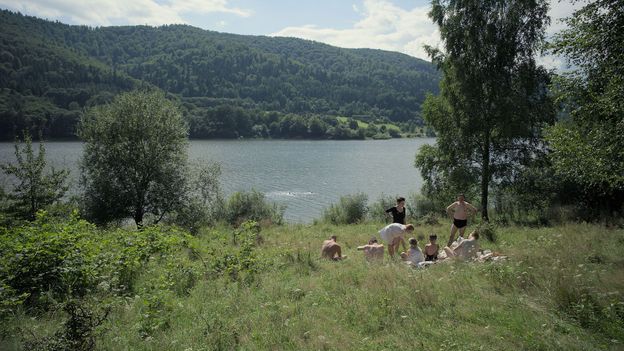The Zone of Interest is ‘a masterpiece’


Hedwig (Sandra Hüller) is showing her mother around her garden in the sunshine. Three years earlier, it was just a field, but now it has neat lawns, paved paths, a pool, a greenhouse, and thriving flower beds. “It’s a paradise garden,” marvels her proud mother. But, of course, the family wouldn’t have their enviable home if it weren’t for the hard work of Hedwig’s husband Rudolf (Christian Friedel). “He’s under pressure like you wouldn’t believe,” she says.
The women’s quiet, middle-class chit-chat could hardly be more ordinary, but it’s rendered dizzyingly surreal and deeply horrific by certain details that they don’t seem to notice: the grey, barbed wire-topped wall on one side of the garden; the barracks and the belching chimney just beyond it; and the constant background noise of industrial rumbling, steam trains chuffing, some intermittent shouting, and the occasional echoing gunshot. Slowly and steadily, without any big, sudden reveal, we learn that Rudolf is Rudolf Höss, the commandant of the Auschwitz concentration camp in Poland, and that he, his wife, and their young children have a contented, healthy, if slightly boring life while thousands of people are killed daily just a few feet away.
More like this:
– New Indiana Jones is ‘like fan-fiction’
– Monster is ‘a marvel’
– Johnny Depp’s return is a flop
Jonathan Glazer, the writer-director of Under the Skin, Birth, and Sexy Beast, has made a Holocaust film like no other – one that makes its point not by depicting the horrors being endured in the camps, but by excluding them. A blood-freezing treatise on the banality of evil, The Zone of Interest is credited as being based on a novel by Martin Amis, but Glazer strips away almost everything in the novel, plot included. The domestic day-to-day business he leaves behind is so understated and undramatic that the film is like a fly-on-the-wall documentary, except that it is composed of beautiful, pin-sharp tableaux. Höss is never shown inside the camp itself, and the nature of his work is barely mentioned, even when he has meetings about quotas and payments with his colleagues. When Hedwig tries on a fur coat that has been delivered to the house along with a bundle of other clothes, and when one of the boys plays with some gold teeth, nobody discusses where the items have come from.
The Zone of Interest
Director: Jonathan Glazer
Cast: Sandra Hüller, Christian Friedel, Ralph Herforth
Run-time: 1hr 45m
The family is even less bothered by human pain and death than the alien played by Scarlett Johansson in Under the Skin. Most of the time, they are concerned with birthday celebrations in the garden and games on the verdant banks of the nearby river. “We’re living how we dreamed we would, with everything on our doorstep,” says Hedwig, so the possibility that they might have to move away if Rudolf is transferred seems to her to be the very height of injustice. The actors are superb: never leaning into the ghastly irony of the Hösses’ situation. There are a few scattered indications that the hideous crimes they are enabling are affecting the family’s mental wellbeing. There are also a few dream-like scenes, shot in stark monochrome by thermal-imaging cameras, in which a Polish village girl commits acts of humanitarian resistance at night. But for almost all of the film, the atrocities are represented only by the occasional burst of unearthly droning music from Mica Levi, and that relentless, nightmarish background noise.
In some ways, the film resembles an abyss-black absurdist comedy sketch or a video art installation. It could be said that its sole observation is the continual co-existence of grotesque cruelty and blithe workaday life, but it makes that observation with such rigorous formal control and unblinking dedication that its power to shock never diminishes. As well as being an important contribution to the cinema of the Holocaust, though, it also touches more widely upon themes of privilege, complacency and compartmentalising. Without wishing to diminish the historical specificity and fathomless malevolence of the characters, Glazer raises the question of how much suffering we are all willing to ignore, just because it’s happening in another part of the world, or just outside our homes, or beyond our own zone of interest. He has made a masterpiece: a great film, and a great work of art.
★★★★★
Love film and TV? Join BBC Culture Film and TV Club on Facebook, a community for cinephiles all over the world.
If you would like to comment on this story or anything else you have seen on BBC Culture, head over to our Facebook page or message us on Twitter.
And if you liked this story, sign up for the weekly bbc.com features newsletter, called The Essential List. A handpicked selection of stories from BBC Future, Culture, Worklife and Travel, delivered to your inbox every Friday.








